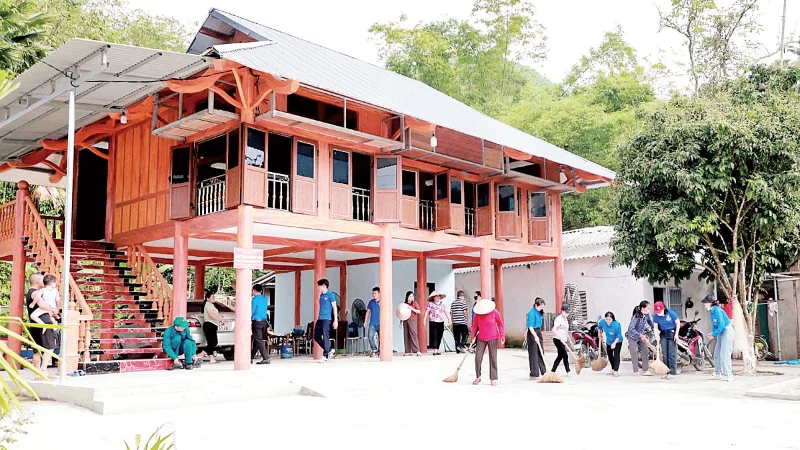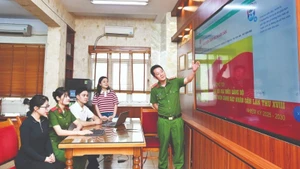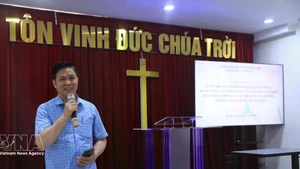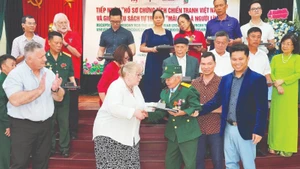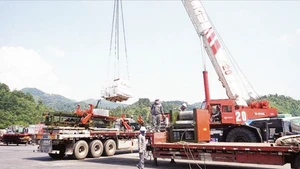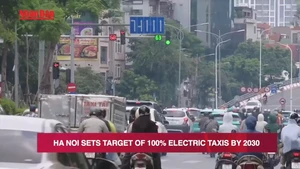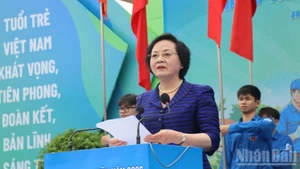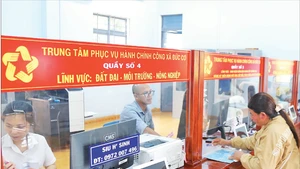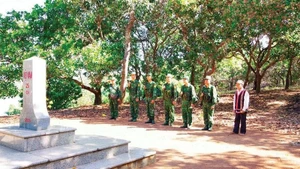These solid, well-built houses are not only shelters for the families but also vivid symbols of the tradition of “Remembering the source when drinking water”, affirming the deep gratitude and great responsibility of the Party, the State, and the whole society towards those who have sacrificed and contributed to the Fatherland.
Mai Trung Lien, a wounded soldier of category 4/4 living in Na Han hamlet, Ngoc Duong commune, Tuyen Quang province, has long lacked the financial means to build a new house due to his poor health and a large family. In early 2025, his family was selected by the commune as a policy beneficiary household eligible for support to eliminate makeshift housing. Lien shared: “During the construction, local officials and residents provided many days of labour to help my family. With the State’s support of 60 million VND, combined with our family’s savings, I completed a new stilt house worth 200 million VND.”
In recent years, Tuyen Quang province has mobilised the entire political system and integrated multiple resources to eliminate makeshift housing for policy households, those who rendered services, and poor veterans. Between 2019 and 2022, the former Ha Giang province implemented a programme to eradicate makeshift housing for poor veterans, policy households, contributors, and impoverished families in border areas. Notably, the entire programme was funded through social mobilisation.
From 2019–2021, the province mobilised over 400 billion VND from organisations and individuals, with the people contributing more than 341,000 workdays. As a result, localities built 6,700 new houses, including 249 for policy households, 605 for poor veteran families, 2,086 for poor households in border communes, and 3,760 for poor households in other areas.
In addition to the 60 million VND support per household, Party committees and local authorities mobilised various forces to contribute labour and resources, helping households build new homes that meet quality standards and suit the traditional architecture of ethnic communities.
Building on that success, when implementing the programme to eliminate makeshift and dilapidated homes launched by the Prime Minister, the former Ha Giang and Tuyen Quang provinces - now the new Tuyen Quang province - set a goal to complete the task by July 27, 2025. With the principle of “State support, people’s effort, community participation”, local Party committees and authorities have mobilised and combined various resources to build homes for people with meritorious services.
In many communes, local people not only contributed labour but also donated building materials and formed construction teams to assist families in eliminating makeshift housing. To date, Tuyen Quang has completed the construction and renovation of 1,065 homes for contributors, achieving 100% of the planned target.
The Provincial Party Standing Committee and the Steering Committee for Eliminating Makeshift Housing assigned specific tasks to each Party committee, authority, department, sector, and organisation in charge of each locality, to ensure timely supervision, guidance, and implementation with quality and progress, while clearly identifying personal responsibility throughout the process.
In the Red River Delta, Hung Yen province is also a locality that has excelled in eliminating makeshift homes for policy families and contributors to the revolution. On June 21, 2025, the former Thai Binh province simultaneously completed two programmes: one to support revolution contributors and martyrs’ families with housing, and one to eliminate makeshift and dilapidated homes for poor and near-poor households. According to Pham Van Nghiem, Vice Chairman of the Provincial People’s Committee, the province completed both programmes 100 days ahead of schedule. As of June 20, 3,007 out of 3,008 households had commenced construction and received financial support. Specifically, 898 out of 899 policy households and martyrs’ relatives (99.89%) received housing support, and 2,109 out of 2,109 poor and near-poor households (100%) had their makeshift homes eliminated.
Thai Binh is among the few localities with the highest level of housing support nationwide - 100 million VND per household for new construction and 50 million VND for renovations. In addition to funding from the State budget, the province leveraged lawful resources such as family savings, support from organisations, enterprises, philanthropists, relatives, neighbours, and labour contributions. Do Van Ve, Chairman of the Thai Binh Business Association, shared that many enterprises in the province donated between 100 million and 600 million VND, helping the province increase its resources and complete the programmes 100 days ahead of schedule.
Nguyen Khac Than, Chairman of the Hung Yen Provincial People’s Committee, affirmed: “The results of the two programmes vividly demonstrate the power of great national unity, the leadership role of the Party committees, the decisive administration of the authorities, and the sense of responsibility and compassion of the business community and the people.” This is also a notable achievement of the former Thai Binh province before its merger with Hung Yen. After completing the two housing support programmes, the province requested localities to continue mobilising the entire society to care for the material and spiritual well-being of contributors, poor households, and the vulnerable.
In Quang Tri, Le Cong Hoan, a war invalid from the anti-US resistance period living in Vinh Tuy 4 hamlet, Quang Ninh commune, was deeply moved to receive State support for housing as a contributor to the revolution. For many years, despite working diligently, he and his wife lacked the means to build a new house, and the family had to live in a deteriorated level-4 house. Hoan shared that the care and support from the Party and Government in helping him build a new, spacious house touched him deeply. It was a great source of both material and spiritual encouragement for contributors like him to stabilise their lives.
Recently, the former Quang Binh province has actively implemented the programme to eliminate makeshift and dilapidated houses, prioritising contributors and martyrs’ families, with various flexible and effective approaches. The province provided 80 million VND per household for new construction and 40 million VND per household for renovation.
In addition to funding from the central budget, the province also supported 20 million VND per household for new construction and 10 million VND per household for renovation from the local budget. As of June 26, 2,177 out of 2,239 houses had commenced construction, including 473 new ones. The province aims to complete 100% of both new builds and renovations before July 27 this year. The former Quang Tri province is also actively implementing its housing support programme for revolution contributors and martyrs’ relatives, aiming for completion by July 27. The total number of houses needing support under the programme is 2,374, including 342 new builds with support levels equivalent to those of Quang Binh.
Nguyen Dang Quang, Deputy Secretary of the Quang Tri Provincial Party Committee and Chairman of the Provincial People’s Council, stated that the programme to eliminate makeshift and dilapidated housing for contributor families and martyrs’ relatives had received close attention and direction from Party committees and authorities. The entire political system from the provincial to grassroots levels has actively and responsibly participated.
The Provincial Steering Committee and its members at all levels have conducted nearly 100 inspections, focusing on communes with large numbers of new builds or repairs and those in particularly difficult conditions, to ensure construction quality and completion timelines. These inspections have shown that the programme has been implemented seriously, methodically, with the right beneficiaries, on schedule, effectively, and has generated wide-ranging impact.
At present, thousands of contributor households in Quang Tri have been granted new homes and sacred altars, relieving their worries ahead of the storm season. The success of the programme lies not only in statistics but in the spirit of gratitude and the noble traditions of the nation.
To build on these achievements, leaders of Quang Tri province have called on Party committees, authorities, and the Viet Nam Fatherland Front to continue promoting communication efforts and mobilising resources to support livelihoods for contributor families, ensuring that their living conditions are equal to or better than the average standard in their residential communities. Agencies and units are urged to propose policies to competent authorities such as vocational training, job creation, access to policy credit, healthcare, and education to help contributor families secure sustainable livelihoods.
